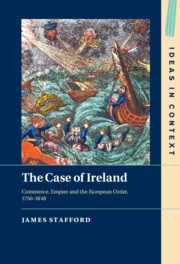Book contents
- The Case of Ireland
- Ideas in Context
- The Case of Ireland
- Copyright page
- Dedication
- Contents
- Acknowledgements
- Introduction
- Chapter 1 The Enlightenment Critique of Empire in Ireland, c. 1750–1776
- Chapter 2 Commerce without Empire?
- Chapter 3 Property, Revolution and Peace, 1789–1803
- Chapter 4 Enlightenment against Revolution
- Chapter 5 The Granary of Great Britain
- Chapter 6 Democracy, Nationality and the Social Question, 1815–1848
- Conclusion
- Bibliography
- Index
Chapter 4 - Enlightenment against Revolution
Commerce, Aristocracy and the Case for Union, 1798–1801
Published online by Cambridge University Press: 27 January 2022
- The Case of Ireland
- Ideas in Context
- The Case of Ireland
- Copyright page
- Dedication
- Contents
- Acknowledgements
- Introduction
- Chapter 1 The Enlightenment Critique of Empire in Ireland, c. 1750–1776
- Chapter 2 Commerce without Empire?
- Chapter 3 Property, Revolution and Peace, 1789–1803
- Chapter 4 Enlightenment against Revolution
- Chapter 5 The Granary of Great Britain
- Chapter 6 Democracy, Nationality and the Social Question, 1815–1848
- Conclusion
- Bibliography
- Index
Summary
Arguments for the 1801 Union of the British and Irish parliaments drew on the intellectual resources of the later British Enlightenment to implement a new system of economic and political regulation of Irish society. Proponents of Union articulated a renewed belief in the ability of commercial integration with Britain to act as a solvent to the confessional and ethnic tensions laid bare by the United Irish rising and attempted French invasions of 1796-8. The 'diffusion' of British capital to Ireland would give Ireland’s shattered Anglican aristocracy the opportunity to re-establish its political legitimacy, while forcing them to share power with a rising Catholic mercantile and professional class. The case for Union was interpreted in a broad European context of state competition and reform. The leading continental defender of British policy, the Prussian diplomat and publicist Friedrich von Gentz, hailed the legislative unification of the British Empire as a model for a necessary consolidation of the European states-system in the wake of French revolutionary violence.
Keywords
- Type
- Chapter
- Information
- The Case of IrelandCommerce, Empire and the European Order, 1750–1848, pp. 139 - 173Publisher: Cambridge University PressPrint publication year: 2022

